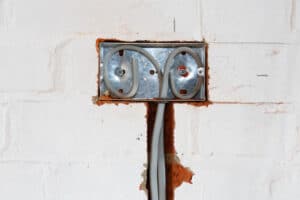Don’t be daunted by the task of rewiring your house while living in it – with some good planning, organizing and comprehension this can definitely be accomplished without going insane! In this article, we’ll provide you essential steps and methods that will allow for minimal disruption to daily life as you go through the process. Let’s take a look at how to get started on successfully completing such an endeavor!
Short Summary
- Careful planning and scheduling is essential for rewiring an occupied home.
- Strategies to create a safe, comfortable living environment during the project should be planned ahead of time.
- Hire certified electricians with experience in electrical safety regulations to ensure successful compliance and protection of homeowners.
Preparing for a Rewire in an Occupied Home

(c) Can Stock Photo / paulmaguire
The risks posed by out-of-date or defective wiring in occupied homes make it critical to address any faults immediately. To ensure a safe and efficient house rewire, proper scheduling needs to be taken into consideration as well as coordinating with other renovations that are being carried out on the property. It is also important for homeowners to take protective measures such as covering up their possessions so disruption can be kept at a minimum while the work progresses.
Scheduling Work
When rewiring a house that is already occupied, it’s essential to pay attention to timing. Scheduling the work prior or during low occupancy levels can help reduce disruption and stress. It would be ideal if this could take place several weeks before people move into the property in order for everyone’s safety.
The two components of such projects are known as ‘first fix’ and ‘second fix’ stages. Thus understanding these aspects is imperative for a successful outcome of the project.
Coordinating with Other Renovations
When you’re ready to do your home’s rewiring, creating a plan in advance can help save both time and money. Drawing out each room on graph paper gives you the chance to illustrate beds, sofas, and kitchen units as well as where the electrical panel is located. This visual will ensure there are no discrepancies between contractor and consumer that could delay progress or cause financial strain. Sticking with this organized blueprint throughout the process will also give homeowners peace of mind knowing they’re getting full value for their investment while enjoying updated wiring within desired timelines.
Protecting Belongings
Hiring a reliable electrician to carry out the rewiring is important since they can complete the task quickly and make minimal disruption. Placing furniture back in its original state daily adds an extra challenge, so having someone who knows what they are doing helps immensely.
For personal items that need protection from dust generated by these works, it’s recommended to store them away under protective sheets in areas with little disturbance from any work being done on site.
Strategies for Living in a House During Rewiring
Living in a house or rental property during rewiring – a disruptive job – can be problematic due to factors such as loud noise, dust and debris which damage plasterwork and skirting boards. The following steps are proposed with the purpose of keeping this space safe, comfortable and versatile despite any changes that may occur: managing sound levels. Reducing/controlling dust amounts. Remaining open-minded when it comes to alterations taking place at the home or property.
Creating a Safe and Comfortable Space
When rewiring a house, it is essential to have an organized plan in place prior to starting the process. This will guarantee a secure and comfortable environment for everyone living there. To maximize efficiency with minimal cost, using existing outlets, pathways and switches when running wires through plastered walls can be beneficial too. One should avoid making any new changes once work has begun as this may lead to delays or extra charges incurred during reinstatement of these adjustments. All things considered, ensuring everything goes smoothly while residing at home while wiring/rewiring begins with thorough planning beforehand!
Managing Noise and Dust
Before beginning the rewiring process in a house that is still occupied, it’s important to reduce any potential dust or noise created. This can be done by protecting furniture and carpets with plastic sheets and removing anything unnecessary from the home itself. Utilizing up-to-date tools and setting expectations for working hours as well as cleanup protocol will help create a more comfortable living environment during this renovation project.
Staying Flexible and Adapting to Change
To ensure a successful project, it is necessary to maintain flexibility and adaptability during rewiring. Homeowners must do their research ahead of time, get an idea of the timeline involved in the process, and prepare for any potential hiccups that could come up along the way. Adding anything additional in between can lead to more delays and expenses so you need to plan out what needs doing before beginning work with an electrician.
Having good communication open at all times with your contractor also serves greatly towards achieving success. Be ready to accept professional advice when needed!
Hiring the Right Professionals for the Job
When selecting an electrician for your rewiring project, it’s essential to consider their expertise and experience. Ensure they have the right skill set needed to complete the job satisfactorily. It’s also important that you evaluate their communication skills as well as customer service standards in order to make sure everything runs smoothly during the process of installation or repair works. Check if they are committed to safety regulations and practices since this is a crucial factor when dealing with electrical hazards associated with renovations like these.
Experience and Expertise
Finding an electrician with at least five years of electrical rewiring experience is essential for your project. They should be certified and qualified to guarantee the safety and compliance of the job, as well as have expertise in techniques which reduce disruption from dust or channelling damage. Electrical work involves a lot of complexity that necessitates specialist knowledge. Thus, it’s imperative to hire experienced professionals for successful completion.
Communication and Customer Service
When hiring an electrician for a rewiring job, good communication and customer service are essential. Establishing parameters such as timelines, budget requirements and communication expectations will ensure that everyone is on the same page throughout the project, enhancing collaboration between all parties involved and providing a great experience to your client. With effective teamwork promoted through clear instructions of what is expected from both ends, success should be within reach!
Safety and Compliance
To guarantee a secure outcome and minimize risks, the importance of adhering to Electricity at Work Regulations 1989 as well as other pertinent electrical safety regulations can’t be stressed enough in any rewiring project. It is essential for both electricians and homeowners that these standards are followed to ensure compliance with building regulations.
Understanding the Rewiring Process
The rewiring process consists of two stages. First fix and second fix. It’s important to understand these steps in order for the project timeline, disruption levels, and expected outcomes to be managed accordingly. Here we will offer insight on what is needed during each stage so that potential issues throughout may be anticipated.
The first fixing includes putting up new cables plus conduits and fitting them (electrical wiring included) into place ready for operation. While the second step involves testing all components after installation has been completed to make sure it complies with safety standards before getting certified off or switched over if agreed upon/required by law.
First Fix
For the initial stage of rewiring, it is necessary to install new wiring, sockets and switches. This could require taking up floors as well as cutting in plasterwork. When undertaking this step, all rooms must be considered when deciding on placements for lights and plug points plus any other electric equipment.
Removing carpets and furniture before beginning can make lifting floorboards or doing work on ceilings smoother with less disruption/disturbance.
Second Fix
At the second fix stage, electrical wiring is connected to the consumer unit (or fuse board). Sockets and switch faceplates as well as lighting fixtures are put in place. This process must be completed carefully before testing of the entire system can begin. When all circuits have been tested successfully and certified by a professional electrician, it’s safe for homeowners to take over control of their home or property again.
Managing Expectations
It’s important to be prepared for the possibility of setbacks, interruptions, and extra expenses while rewiring. Keeping open communication with your contractor as well as organizing priorities can help ease this process along. Noting every activity done in a living space plus articulating problems like they are aims will lead to a more bearable experience during rewiring.
Electrical Safety Considerations
Ensuring the security of your home’s electricity system is incredibly important. Here, we’ll look at the relevance of getting an electrical assessment done as well as keeping circuit breakers and consumer units up-to-date plus installing smoke alarms along with other safety measures.
A proper electrical inspection can guarantee that everything in your dwelling meets regulations while providing extra reassurance to you. An electric survey may also bring added peace of mind.
Electrical Inspection
Electrical inspections are a must before any significant renovation. They determine if wiring needs to be renewed or if small fixes can do the job and guarantee that your home’s electrical system is up-to-date, complying with safety regulations as well as working effectively. Inspections should be conducted regularly for optimal results. Evaluating all wires installed in the house verifies their integrity and conformity with ordinances governing such components. By examining this area, you ensure rewiring isn’t necessary and thus avoid trouble later on down the line.
Circuit Breakers and Consumer Units
To ensure the safety and efficiency of an electrical system, circuit breakers and consumer units must be installed correctly with all wiring up-to-date in line with current regulations. These devices are necessary for controlling increased power load from contemporary equipment as well as preventing any potential fire hazards related to electricity. It is essential that these items remain functional so they can protect wires against overloading, which otherwise may cause damage or injury due to fires caused by faulty circuitry.
Smoke Detectors and Other Safety Devices
Electrical safety is of utmost importance in protecting your home and family. Smoke detectors, fire extinguishers, carbon monoxide alarms and emergency lighting all play a vital role in safeguarding from possible emergencies. Devices such as fuses, circuit breakers and surge protectors should also be installed to keep any potential hazards at bay. Taken together, these items can provide peace of mind when it comes to electrical safety for the entire household.
Summary
Finally, taking on a house rewiring project while living in it is entirely doable if the right planning and preparation take place. By following the advice laid out here, you can minimize any disruption that might come with such an undertaking and still have a comfortable home to live in during its duration. It’s of utmost importance to prioritize safety throughout this process. Working with certified professionals who know how to ensure compliance should be essential for achieving success when tackling this job.
No matter whether your goal is simply upgrading your electrical system or remodelling it completely—letting this guide serve as a roadmap will set you up for success. Careful organization, and active communication between all involved parties are required steps before starting work, plus making sure safety protocols are observed at every step guarantees ultimate results without compromising anyone’s well-being along the way!
Frequently Asked Questions
Can you live in a house whilst its being rewired?
Having a house rewired requires close collaboration between the homeowner and electricians for safety to be ensured. As such, all precautions must be taken while living in said property during this process. Hazards should also not go unacknowledged as they could arise from any aspects of the rewiring work itself.
To maintain a secure environment throughout, it is critical that everyone involved follows sound protocols when conducting tasks related to having the home wired up again correctly, with proper compliance being paramount for the successful completion of works carried out by these technicians working onsite at your residence.
Can you rewire a house without taking the walls down?
Electricians can perform the task of rewiring a house without having to take down any walls by accessing the wiring through its crawlspace, making it both convenient and secure.
How do I prepare my whole house for rewiring?
Before you begin rewiring, carefully plan it out and remove any furniture or carpets that could obstruct the process. Make sure all local regulations are respected as well as securing necessary permits. Consider what types of wires will be used (e.g., data, fire security). When mapping your strategy for this project, bear in mind already existing infrastructures too.
How can I minimize the disruption caused by rewiring a house?
To limit the disturbances when conducting a house rewire, it is important to have an orderly timetable for the completion of tasks and coordinate with other ongoing renovations in the property. This could involve activities such as painting or changing flooring. Any personal belongings within the home should be suitably safeguarded while work takes place. Having proper scheduling helps make sure that all aspects of a house rewire are completed quickly and seamlessly – thereby minimizing disruption as much as possible.
How do I choose the right electrician for my rewiring project?
When making a decision about which electrician to hire for your rewiring project, review their credentials and communication skills. Examine safety protocols as well as customer service standards they must meet. Assure that the applicant has enough experience and knowledge related to this task.
Ask around for feedback from earlier clients. Look into references available too. Ask how much it would cost including labour expenses and supplies required in writing beforehand. Also, make sure the electrician is licensed and insured according to current regulations before hiring them.





